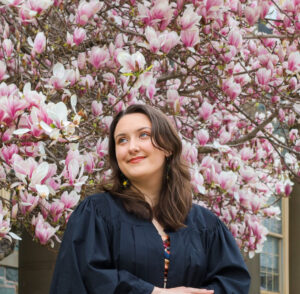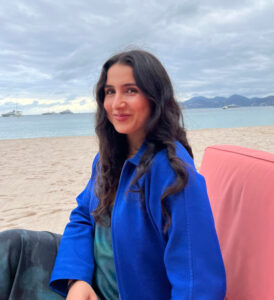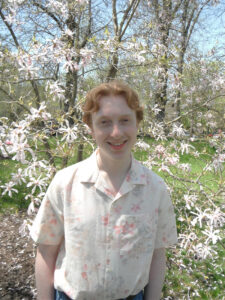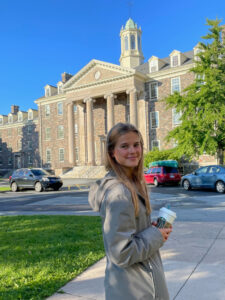Jessica Casey
 Jessica Casey has just wrapped things up. She’s completed her coursework, defended her honours thesis and she’s finished her duties as co-president of the Contemporary Studies Society. Next, she’ll move back to her hometown, Paradise, Nfld., for the summer before a bigger move to Vancouver for a Masters in Science and Technology at the University of British Columbia. That’s the big picture. The details cover four years of intriguing choices and achievements marked by confidence, clarity and a few spins on her King’s journey that made it uniquely her own.
Jessica Casey has just wrapped things up. She’s completed her coursework, defended her honours thesis and she’s finished her duties as co-president of the Contemporary Studies Society. Next, she’ll move back to her hometown, Paradise, Nfld., for the summer before a bigger move to Vancouver for a Masters in Science and Technology at the University of British Columbia. That’s the big picture. The details cover four years of intriguing choices and achievements marked by confidence, clarity and a few spins on her King’s journey that made it uniquely her own.
Central to it all, through the Foundation Year Program (FYP) and Contemporary Studies (CSP), Casey, a combined CSP and social anthropology major, has reveled in the programs’ interdisciplinary nature that’s allowed her to focus on a subject of great importance to her: Indigenous social health. “I grew up urban Indigenous. I’m of Inuit ancestry,” she says in explanation. “In CSP I’ve been able to put topics that are important to Indigenous people at the centre of my academic life. The subject of my thesis was epistemology, Indigenous social health in the history of medicine. I wrote about the history of tuberculosis, and tuberculosis sanitoriums and Inuit communities, tracing the intersection of the sanitariums and all of the pain and racist histories.”
Even more specifically, Casey explored how this impacted Indigenous knowledge and ways of knowing about health. “I have been studying this with forward-facing interest—how can we go forward and create more culturally conscious care for Indigenous people in medicine and health?” Her pre-grad school summer won’t be idle; she’s received a research grant through Scotia Scholars to continue the tuberculosis research she began for her CSP thesis. “People are becoming more and more aware of the status of tuberculosis as a curable illness that, because of structural inequality, kills millions of people,” Casey says.
Mental healthcare is also core to Casey’s health interests; she’s been a mental health peer support worker with the “Stay Connected” Mental Health program at King’s for the last two years. “As a part of the program I’ve held open drop-in hours for fellow students to come in and talk about mental health struggles. I’m an active listener and I do some service navigation. Having a peer-to-peer supportive connection with another student can be really helpful for someone who is struggling. It’s a wonderful program. It’s been an honour to be a part of it.”
Casey is moving on with rich memories and deep appreciation. “I had a real excitement about FYP. Even through the screen (her first year was online) it was a motivational force. I got really excited about different ways that I could take all of these theoretical ideas that I was learning and put them into important issues that are happening in the world now. And in CSP, I will remember the absolute joy and pleasure of working with Dr. Glowacka on my thesis.” She’ll remember as well, the simple things…just being on campus, going to KTS productions. “I loved hanging out in the Galley and getting grilled cheese. I’ll remember the joy of watching people walking through the halls and out into the night in their Formal Meal gowns.”
Elia Gross
 Elia Gross hadn’t heard of King’s until one of her high school teachers told her about the Foundation Year Program (FYP). “The way it was being spoken about, it was just so…otherworldly,” she says. “Honestly, I thought ‘how could this level of education be happening in Canada?’” Her FYP experience, while first rate, was, unfortunately otherworldly in a different way: due to the pandemic, she took her classes online from her residence room in Radical Bay. Still, Gross relished the quality of online learning that the college created. “I was motivated by being with a group of people who were ‘all in.’ I was excited to just jump in headfirst.” With daily life opening up, Gross spent the summer after FYP in Halifax teaching spin classes and getting to know and love the city.
Elia Gross hadn’t heard of King’s until one of her high school teachers told her about the Foundation Year Program (FYP). “The way it was being spoken about, it was just so…otherworldly,” she says. “Honestly, I thought ‘how could this level of education be happening in Canada?’” Her FYP experience, while first rate, was, unfortunately otherworldly in a different way: due to the pandemic, she took her classes online from her residence room in Radical Bay. Still, Gross relished the quality of online learning that the college created. “I was motivated by being with a group of people who were ‘all in.’ I was excited to just jump in headfirst.” With daily life opening up, Gross spent the summer after FYP in Halifax teaching spin classes and getting to know and love the city.
For Gross, Contemporary Studies (CSP) was an easy choice, allowing her to make interdisciplinary connections and complement her other major, philosophy. It was towards the end of her third year, Gross says, that she really found her footing. “I took Daniel Brandes’ Twentieth Century Giants of Jewish Thought. Daniel Brandes is kind of a giant of King’s. I’d attended his lectures on Hannah Arendt in FYP and I was curious about him and excited about his class in Jewish philosophy.”
Something instantly clicked in Brandes’ class. “For the first time I was interrogating my Jewish identity in an academic setting. It allowed me to be more imaginative and daring than I could be amongst my Jewish peers or family. And to be doing so alongside some people for whom exploring the Jewish culture and religion was something new—they’re looking at it from a fresh perspective and with an innocent eye—was very inviting for me.”
“I feel like this has been one long journey of self-discovery.”
Gross was drawn to the work of Hannah Arendt, the 20th century German-American political philosopher. It became core to Gross’ CSP thesis, exploring how Jewish identity in the diaspora is shaped by notions of exile and trauma and how what scholars call “the exilic consciousness”—having exile as a part of your being and a part of how you move around the world—impacts your engagement with your own history. “I used the work of Arendt and other scholars to explore that perhaps this experience of loss, exile and persecution can be a legitimate starting point from which one can ethically open oneself up to the other, rather than the point from which one isolates themselves from the world.” The experience, Gross says, was deeply personal. “I feel like this has been one long journey of self-discovery.”
Graduate school may be next—she’s been accepted into a master’s program at Brandeis University where she’d continue to pursue Jewish studies. Or Gross may work this year, possibly in political advocacy or programming. Her appreciation for King’s runs deep. “I feel like I had a higher level, connected experience that I would not have had anywhere else. Sarah Clift, who was my thesis advisor became a really great mentor to me. Everyone at King’s is so warm and wants the best for you, giving you advice and ideas that you never would have imagined for yourself.”
Kyle Hardy
 Kyle Hardy has a simple answer as to why he did Contemporary Studies (CSP): “I really enjoyed what we were reading in the later sections of FYP [the Foundation Year Program], all the books that came after the French Revolution, so I was like, okay, this is the stuff I want to talk about.” But not surprisingly, he has a richer, more precise answer as well: “These writers and thinkers had access to all the earlier writing that we have access to and they draw from everything that came before them. It felt like, if you want to talk about anything, the whole history of human thought up to this point, really, CSP was the way to go. And CSP drew all kinds of different things together…philosophy, literature, art, politics and culture so that you think about things in a holistic way. I found that very appealing.”
Kyle Hardy has a simple answer as to why he did Contemporary Studies (CSP): “I really enjoyed what we were reading in the later sections of FYP [the Foundation Year Program], all the books that came after the French Revolution, so I was like, okay, this is the stuff I want to talk about.” But not surprisingly, he has a richer, more precise answer as well: “These writers and thinkers had access to all the earlier writing that we have access to and they draw from everything that came before them. It felt like, if you want to talk about anything, the whole history of human thought up to this point, really, CSP was the way to go. And CSP drew all kinds of different things together…philosophy, literature, art, politics and culture so that you think about things in a holistic way. I found that very appealing.”
Hardy is graduating with Combined Honours in CSP and philosophy and, “with enough classics that it could have been another major.” The Halifax native came to King’s for FYP, was in search of a community that valued intellectual rigor and where he felt he would be challenged—and challenge himself. “It’s always been important to me to push myself into things that I find difficult.”
That self-challenging motivation influenced the direction of Hardy’s CSP honours thesis which focused on the work of 20th-century Viennese philosopher Ludwig Wittgenstein. “He had a reputation for difficulty, and I wanted to focus on something that would be intellectually challenging.” Hardy’s academic pursuits shaped his leisure activities as well, excluding, of course, his love of tabletop role-playing games (like Dungeons & Dragons). He was President of the Classics Society at Dalhousie for three years, a society that, he says, is dominated by King’s students. “For a lot of students, FYP becomes their gateway into the classical world.” A highlight was the annual Pythian Games with performances in ancient and modern languages, Hardy functioning, for most part, as the show’s producer.
In the fall, Hardy will begin an MA in Philosophy at the University of Toronto continuing, at least initially, his study of Wittgenstein’s work focused on anthropology. As for King’s, Hardy has great regard for the community’s boldness. “I admire that King’s is a student community that is engaged in thinking about the world and when they think there’s something to be done, if there’s an injustice, you can count on King’s students to have something to say about it.”
Rachel Meyerowitz
 When students express what they like about King’s, they’ll often cite the small, enveloping community, the ready friendships, the exhilarating challenge of the Foundation Year Program (FYP). Rachel Meyerowitz embraced it fully—and more. She came with a hunger to experience both King’s and as much of the wider community, including Dalhousie and the city, as she could.
When students express what they like about King’s, they’ll often cite the small, enveloping community, the ready friendships, the exhilarating challenge of the Foundation Year Program (FYP). Rachel Meyerowitz embraced it fully—and more. She came with a hunger to experience both King’s and as much of the wider community, including Dalhousie and the city, as she could.
“I loved FYP, and I wanted to maintain a strong connection to King’s,” Meyerowitz says. Doing combined honours in Contemporary Studies and religious studies gave her the footing at both King’s and Dal she was looking for. She got involved in Hillel International at Dal and played for the Dalhousie Tigers Tennis Team. Meyerowitz laid down some city roots by coaching tennis at Halifax’s Waegwaltic Club. “I’ve loved being a part of the Halifax community in different ways where I was not just meeting fellow students.”
CSP, Meyerowitz says, supported her strong desire to focus outward. “I love that it was interdisciplinary and helped me understand the world and the communities that I’m a part of. I love that it encouraged us to think critically about where we are today, to engage in the world in an intentional way and take nothing for granted.” Last year she did the month-long Memory, Politics, Place: Berlin’s Twentieth Century program in Berlin and last summer she spent six weeks teaching in Cambodia, as well as competing in tennis at the Canadian University Nationals. The summer before, she participated in Israel’s Maccabiah Games, representing Canada in tennis.
Meyerowitz’s religious and cultural roots have been central to her academic pursuits. Her CSP thesis explored the connection between the experiences of Jewish, Romani and Queer people during the Holocaust. “My Jewish identity has been transformed through my time here in the best way and it’s something that I’m so grateful for, and something that is probably one of my biggest takeaways about university.” As for King’s specifically, she says, “This is a special place and I wouldn’t have gotten to where I am without it. The fact that you can bring who you are to the courses and to your writing is so amazing and important to me. I was encouraged to do that by the class and by my professors and that’s made it such an enriching experience.”
In September her world gets larger still; Meyerowitz is moving to Budapest to do development work in the Jewish community. “The Jewish community of Budapest is rebuilding itself post-Holocaust and post-communism. It is a place where it’s cool to be Jewish with more Jewish cultural events than I’ve ever seen. And I think the reason that they’ve been able to do that is because they know that no Jewish person can feel like they don’t belong in their community.”

